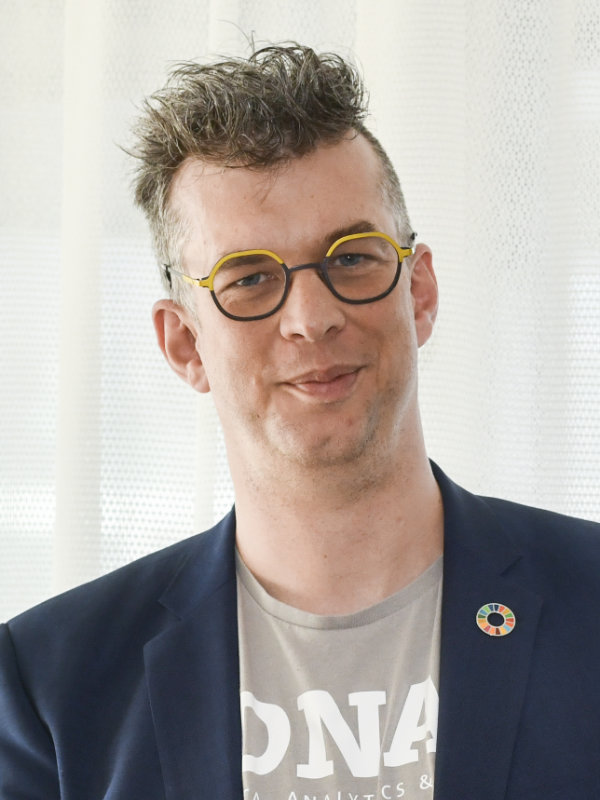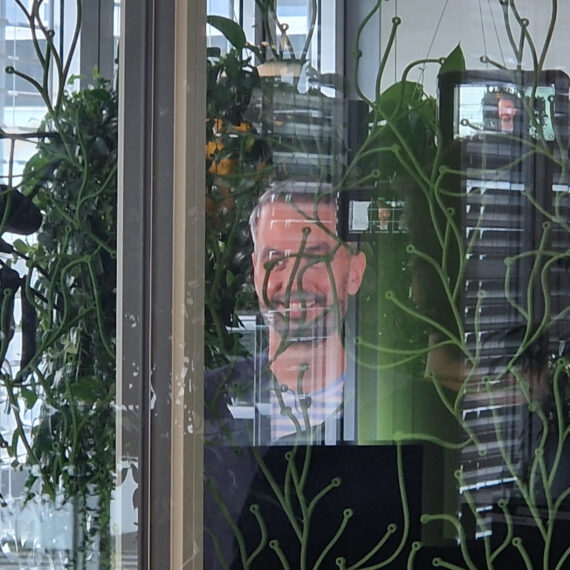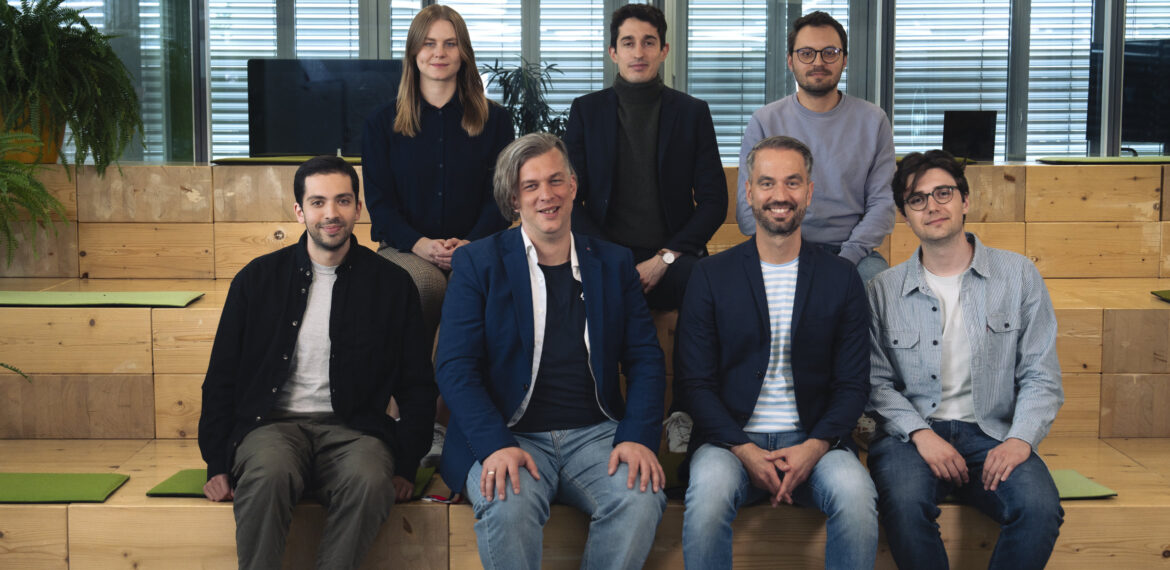In the Digital Lab, Swisscom conducts research into artificial intelligence solutions that help improve its own processes while also benefiting customers. In the second part of our interview, Directors Daniel Dobos and Dominik Temerowski talk about AI-based applications and the various aspects of AI security.
The walk from the EPFL metro station to the Swisscom Digital Lab is also a journey through time to some degree. Passing Musée Bolo, a museum lovingly dedicated to the history of computers and thus the past, the path takes you to future studies at the building that is home to the Digital Lab. Ideas can flow freely in the Lab thanks to its open-space design and lead to specific projects from which Swisscom customers benefit in a variety of ways. The second part of our interview with Dominik Temerowski and Daniel Dobos, Directors of the Digital Lab, focuses on specific applications of (generative) AI – and the role cybersecurity plays in this environment.
Which areas of artificial intelligence does the Digital Lab focus on?
Dominik Temerowski: In general, we want to use AI to improve the quality of Swisscom services and our customers’ experiences in customer service and the use of our services. For example, we work with the Network, Marketing, Sales and other Group functions. We’re involved in many of Swisscom’s AI topics with the innovations developed here.
Become a digital leader
Develop sustainable business models with the help of AI? Or digitalise internal processes with low-code platforms? Discover further areas where you can drive your transformation and become a digital leader.
Daniel Dobos: There are two or three areas in which our expertise is frequently in demand at the moment. Medical solutions are one example. We’re conducting research in this area with EPFL and hospitals in Switzerland, as well as with international organisations. Here, for example, the focus is on how to reliably implement a chatbot that will answer medical questions. EPFL has just presented its latest results on an open-source model of this kind called Meditron. Experts are of the view that it answers medical questions about as well as a physician with five to seven years of professional experience.
What interests us is how we can implement such applications in a safe and secure way without disclosing medical data and so that they can later be used by emergency crews even in critical situations. For example, how we can use our 5G network to ensure that a connection is maintained to such systems that will eventually become part of the critical infrastructure, even in exceptional scenarios. The focus is therefore less on functionality and more on the safe and secure use of these systems.
Are there specific examples of (generative) AI applications developed by the Digital Lab?
Dominik Temerowski: We’ve developed the Chatbot Builder platform together with our colleagues at Swisscom who are working with conversational AI. If you had a question about a technical, personnel, legal or other business matter in the past, you called someone. Countless calls and emails were being made every day to get answers to such questions. This was inefficient and led to hours of searching.
‘We want to use AI to improve the quality of Swisscom services and our customers’ experiences in customer service and the use of our services. ’
Dominik Temerowski
Departments can now use Chatbot Builder to create their own chatbots. They can upload user manuals and other data to the secure platform so that the chatbot can answer general questions. Now, colleagues can turn to the chatbot instead of endlessly ringing around, letting the AI do the work and saving time and money in the process. Our Chatbot Builder platform is making Swisscom more efficient every day.
Chatbots make us more efficient. But with their great ‘knowledge’, are they also changing the way we handle information?
Daniel Dobos: That’s something we’re looking at very closely. We conducted a study together with a university of applied sciences looking at how the use of generative AI tools is changing our work. We wanted to investigate how memory performance changes when using tools such as ChatGPT. There were many studies on this at the advent of the internet because people were very concerned about whether anyone would bother remembering anymore who wrote Romeo and Juliet or who was the president of Bolivia if you could just look up everything on the spot. These studies suggest that people are less able to remember the information they went looking for if they expect to have access to it in the future. Instead, they are more likely to know where to find it.
What happens if we get used to tools such as personal artificial intelligence assistants? Will it ultimately mean we no longer remember anything or retain other information? We’re looking at these aspects in the research, with implications for work and the ways in which we work.
Security is an important issue with large language models, i.e. ensuring that chatbots don’t hallucinate or disclose training data. How important is cybersecurity in the Digital Lab?
Daniel Dobos: The connection between artificial intelligence and cybersecurity is an important issue. We’re looking at this together with our cybersecurity colleagues and also in collaboration with the ETH Zurich and EPFL research centres. Everyone is talking about the need for joint red teaming on the language models. This means thoroughly testing AI solutions with the aim of deliberately putting them into situations where they violate security or privacy.
But the question of how to go about this is bigger than even the researchers themselves can handle. The AI researchers tell us that they are not sufficiently familiar with cybersecurity, and they just about understand the models. The cybersecurity people tell us that they understand cybersecurity, but not yet these large language models.
‘We’re working together with Swiss researchers to see how we can use models and at the same time strengthen user trust in the technology.’
Daniel Dobos
We’re in the process of forming groups to consolidate the lessons learnt from recent years of cybersecurity development. We’re particularly focused on how we can work together collaboratively across different companies and organisations. We are combining this knowledge with our experience in the field of artificial intelligence. This means we can form new teams with expertise in both areas and explore how to bring these two worlds together. Of course, this fits perfectly with Swisscom, where cybersecurity and artificial intelligence are both key issues.
The security of the models is not the only factor, of course. Data security comes into play when processing company data in particular: what if the data has to be processed and stored in Switzerland?
Daniel Dobos: We’re also seeing this issue in the legal field, for example. We’re currently investigating how AI might be used to provide translations for legal experts and law firms who are not allowed to have their data outside Switzerland. This is where we can rely on services such as the Swiss AI Platform. With these, we can ensure that the data is stored in Switzerland, that the GPUs are in Switzerland and that everything is fully subject to Swiss law.
The situation is similar for some banking applications. Wherever data storage and processing are mandatory in Switzerland, it’s not just a question of whether a particular model can perform the tasks to a sufficient level of quality, but also ensuring that the data never leaves Switzerland.
The market for AI services is dominated by a few large providers. What role can Swisscom play in this environment?
Dominik Temerowski: As Swisscom, we can play a significant role in the areas of confidence, precision and multilingual capability. Together with Swiss researchers, we’re looking at how we can build and use models and at the same time strengthen user trust in the technology. Data privacy is important here: how can we build models that give personalised recommendations without compromising data security or privacy? Given user confidence in our Swiss values and precision, we have a unique opportunity to offer such models.
Become a digital leader
Develop sustainable business models with the help of AI? Or digitalise internal processes with low-code platforms? Discover further areas where you can drive your transformation and become a digital leader.
The interlocutors

Dr Daniel Dobos is Research Director at Swisscom. He is responsible for relations with universities, universities of applied sciences and other research institutions. Together with employees from all Swisscom business areas, he and his team develop solutions that use the latest research and technology developments for the benefit of Swisscom customers. Previously, he led research and AI data analysis projects at the CERN research centre and at the United Nations.
Dominik Temerowski is Director of AI & Innovation at Swisscom. Together with Swisscom’s business units, he develops AI-based innovations with a team of data scientists and machine learning engineers that create measurable added value for the company. Previously, he was responsible for partner management in the business customer division at Swisscom and previously at Deutsche Telekom, both of which focused on the digital transformation of B2B customers.








